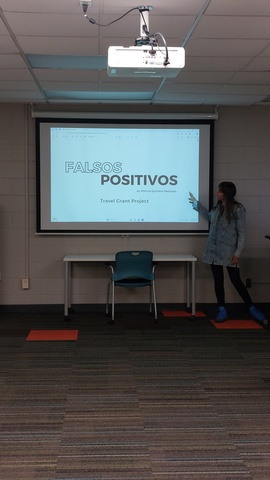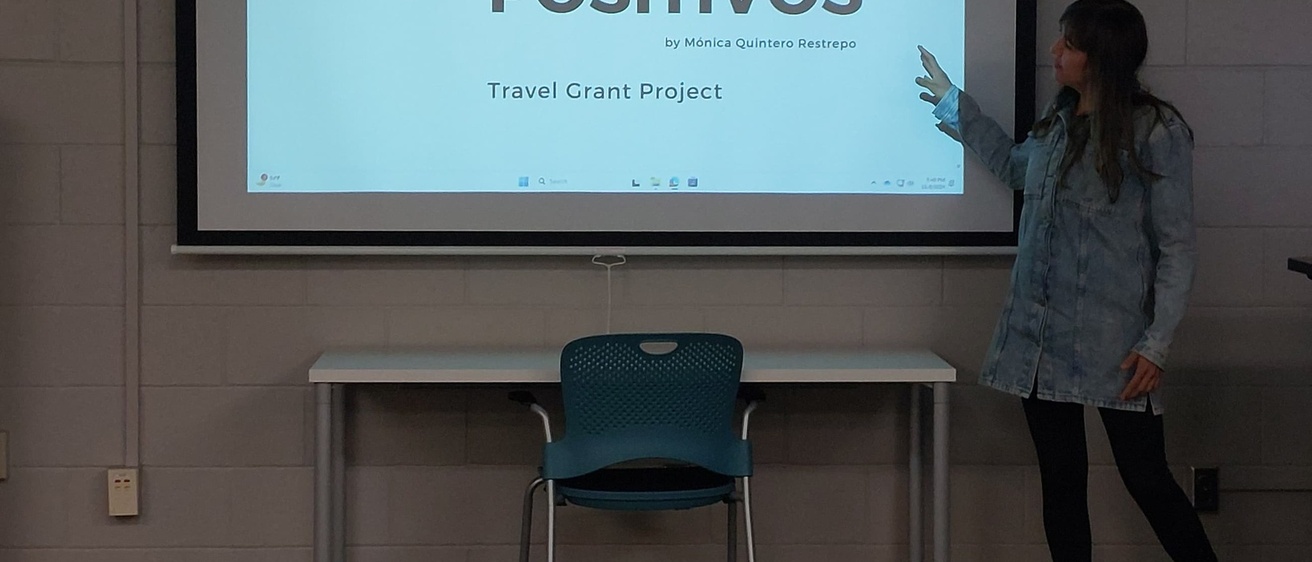Last summer, Mónica Quintero Restrepo, a current graduate student in the MFA in Spanish Creative Writing program, received a CTGL Travel Grant that would facilitate her research and writing on a project focused on the False Positives controversy in Colombia. Recently, she shared a brief reflection on her trip, its highlights, and why she is drawn to the community and sharing their stories. Here's some of what she had to say:
Going to Colombia to write with mothers of False Positives was a profound experience. It’s impossible not to be moved by it and reflect on your own story.
False Positives is a tragedy in Colombia that occurred between 2002 and 2008 that involved the killing of innocent people by military personnel. The military attempted to pass the victims off as combat casualties to falsely demonstrate that the military was winning the civil war. A special peace court in the country, created by a 2016 agreement between the government and its largest rebel group, accused the military of killing as many as 6,402 civilians.
As a writer, my primary focus has always been on memory. For my proposed CTGL project, I wanted to go to Medellin to write with mothers and sisters of False Positives. I spent a month there and conducted two writing workshops and several interviews. My main goal was to provide a space for the women to write and speak about loss. And they did.
One of the participants was a teacher who had to leave her hometown because of the war. Her brother was killed two years ago. Here is my translation of what she wrote:
It was Friday, and I was walking home with a colleague in Cocorná. It was a thirty-minute walk along a rural road in the countryside. We were getting close to La Trinidad waterfall —named for a Virgin statue there —when we heard gunshots, one after another. We had to stop. My colleague asked, “What should we do?” and I answered, “Just wait.” We were directly in front of where the men were killing someone, but we couldn’t see clearly because there were a lot of trees and a ravine. They had seen us, so staying quiet and still was mandatory. “Should we go back?” my colleague asked. She was terrified. “No. We need to wait until they come to us,” I replied. Our hands were shaking. They finally came, and one of them had his head covered with a t-shirt. I recognized him: he had been my student a couple of years ago. They asked what we were doing. “Waiting, we’re heading to Cocorná,” I said. “Well,” they replied. “You haven’t seen anything.”
They continued on, taking the same path we had already walked. We moved forward, crossing the bridge near the waterfall and the Virgin statue. She had also seen the whole scene, and she too could do nothing. A few meters ahead, was found the body of the murdered man. He was lying on his stomach, wearing a yellow t-shirt and brown trousers, his hands tied. I recognized him; he was someone who had come to the town a couple of months before. People were saying the guerilla had taken him about a week ago. His wive sold empanadas on a corner in town, right along the route I took home. We arrived in the evening. She was there, on the corner, and asked me if I had heard anything about her husband. She was worried; someone had taken him again in the afternoon. “No,” I replied. “I haven’t seen him”. I carried on toward my house.
This woman is still writing. Through the workshops, I realized that some of these women have stories that need to be told through longer projects. I am currently helping two of them with their writing. When I wrote my Travel Grant project proposal, one of my purposes was: “As a writer, I wholeheartedly believe that writing serves not only as a solace for grieving but also as a powerful mechanism of storytelling. Poetry could aim to help these mothers in expressing their truth, but more significantly, in preserving their memories.” I am certain that helping them write is the best way to achieve this. We did it during the workshops and interviews in Medellin, and we continue it now through their current projects.
I am also working on my book, which is centered on the dead, and includes a collection of poems specifically about False Positives. I believe this tragedy should be translated and shared. This grant was essential for deepening my understanding of this tragedy and has helped me in my writing. It’s not the same to read about it as it is to talk directly to the people who have experienced it. It’s not the same to write about it alone as it is to write with those people who have lived it.
As I mentioned at the beginning of this report, it’s impossible not to be moved. I am writing and translating with the hope of publishing because this tragedy needs to be expressed. It was 6,402 innocent people who were killed. I am profoundly grateful with this grant, as it provided fundamental experience for my current work.

Above: Monica presenting on her travel experience at the Intercambios event hosted by the Department of Spanish and Portuguese
To learn more about the CTGL Travel Grant and the 2026 application cycle, follow the CTGL on Instagram and sign up for our newsletter!
